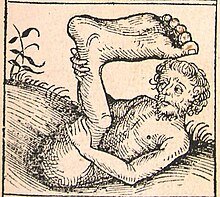The Birds (play)
The plot of the play revolves around Pisthetaerus, an Athenian who convinces the birds to create a great city in the sky, and thus regain their status as the original gods.
He is happy to discuss their plight with them, and meanwhile one of them has a brilliant idea: the birds, he says, should stop flying about like idiots and instead should build themselves a great city in the sky, since this would both allow them to lord it over men and enable them to blockade the Olympian gods in the same way that the Athenians had recently starved the island of Melos into submission.
On discovering the presence of men, the newly arrived birds fly into a fit of alarm and outrage, for mankind has long been their enemy.
The cleverer of the two Athenians, the author of the brilliant idea, then delivers a formal speech, advising the birds that they were the original gods and urging them to regain their lost powers and privileges from the johnny-come-lately Olympians.
After discussion, they name the city-in-the-sky Nephelokokkygia, or literally "cloud-cuckoo-land" (Νεφελοκοκκυγία), and then Pisthetaerus begins to take charge of things, ordering his friend to oversee the building of the city walls while he organizes and leads a religious service in honour of birds as the new gods.
During this service, he is pestered by a variety of unwelcome visitors, including a young versifier out to hire himself to the new city as its official poet, an oracle-monger with prophecies for sale, a famous geometer, Meton, offering a set of town-plans, an imperial inspector from Athens with an eye for a quick profit, and a statute-seller trying to peddle a set of laws originally written for a remote, barely-heard-of town called Olophyx.
They promulgate laws forbidding crimes against their kind (such as catching, caging, stuffing, or eating them), and they end by advising the festival judges to award them first place or risk getting defecated on.
Pisthetaerus returns to the stage moments before a messenger arrives with a report on the construction of the new walls: they are already finished thanks to the collaborative efforts of numerous kinds of birds.
When The Birds was performed in 414 BC, Athenians were still optimistic about the future of the Sicilian Expedition,[6] which had set out the year before under the joint command of Alcibiades, who had promoted it enthusiastically, and Athens' most experienced general, Nicias, who had opposed the venture.
In spite of this public optimism, there was ongoing controversy in Athens over the mutilation of the Hermai, an act of impious vandalism that had cast ominous doubts over the Sicilian Expedition even before the fleet had left port.
The vandalism had resulted in a 'witch-hunt' led by religious extremists and endorsed by priests of the Eleusinian Mysteries, leading to the persecution of rationalist thinkers such as Diagoras of Melos.
[7] Alcibiades himself was suspected of involvement in anti-religious activities and a state ship Salaminia was sent to Sicily to bring him back to trial.
However, he managed to escape from custody and a reward of one talent of gold was subsequently offered by the Athenian authorities to anyone who could claim responsibility for his death.
[8] Alcibiades had already been a controversial figure in Athenian politics for some years before then – he had combined with Nicias to bring about the ostracism of the populist leader Hyperbolus.
The following explanation of topical references in The Birds is based on the work of various scholars[2][9][10] (commonplace references to conventional gods are omitted): Places Foreigners Poets, artists and intellectuals Athenian politicians and generals Athenian personalities Historic, religious and mythical figures It has been argued that The Birds has suffered more than any other Aristophanic play from over-interpretation by scholars.
